Red Cross urges everyone to prepare for dangerous high temperatures

PORTLAND, Ore. (KTVZ) -- A dangerous heat wave is headed to this area over the next several days, with temperatures much higher than normal. Many areas already have wildfire activity and there is a danger of more wildfires starting because of the ongoing drought. The American Red Cross Cascades Region is working with emergency officials and preparing to respond if necessary.
“These conditions pose a high risk to everyone,” said Rebecca Marshall, Regional Disaster Officer. “Older adults, those with chronic medical conditions, people who work outside, infants, children and athletes are more at risk during this extreme heat. Some medications make the high temperatures effects worse. People with heart disease, poor blood circulation, obesity and mental illness are also at risk for getting sick. We have steps people can take to remain safe and urge you to follow them.”
HEAT SAFETY
- Never leave children or pets in your vehicle.
- Stay hydrated by drinking plenty of non-caffeine and non-alcoholic fluids.
- Check on family, friends and neighbors without air conditioning, who are alone or who are more likely to be affected by the heat.
- If you don’t have air conditioning, seek relief from the heat in places like schools, libraries, theaters, malls, etc.
- Avoid extreme temperature changes.
- Wear loose-fitting, lightweight, light-colored clothing.
- Slow down, stay indoors and avoid strenuous exercise during the hottest part of the day.
- Postpone outdoor activities.
- Take frequent breaks if working outdoors.
- Check on animals frequently. Make sure they have plenty of cool water and shade.
WILDFIRE SAFETY
BE PREPARED TO EVACUATE AT A MOMENT’S NOTICE and obey all evacuation orders from officials. Follow these steps (if time allows):
· Shut all windows and doors. Remove flammable window shades, curtains and close metal shutters.
· Move flammable furniture to the center of the room, away from windows and doors.
· Shut off gas at the meter; turn off pilot lights. Shut off the air conditioning.
· Gather up flammable items from the exterior of the house and bring them inside (patio furniture, toys, trash cans).
· Turn off propane tanks. Move propane BBQ appliances away from structures.
· Don’t leave sprinklers on or water running, they can affect critical water pressure.
· Back your loaded car into the driveway and keep all doors and windows closed.
· Ensure your emergency supplies kit is in your vehicle.
· Locate your pets and take them with you.
IF THE POWER GOES OUT
· Don’t touch downed electrical power lines.
· Use flashlights in the dark, not candles.
· Eliminate unnecessary travel, especially by car.
· Learn how to use generators safely.
· Keep refrigerator and freezer doors closed as much as possible.
· First use perishable food from the refrigerator. Perishables should have a temperature of 40 degrees Fahrenheit (4 degrees Celsius) or below to be safe to eat. Then use food from the freezer.
· Use your non-perishable foods and staples after using food from the refrigerator and freezer.
· If it looks like the power outage will continue beyond a day, prepare a cooler with ice for your freezer items.
· Keep food in a dry, cool spot and keep it covered at all times.
· Turn off and unplug all unnecessary electrical equipment, including sensitive electronics.
· Turn off or disconnect any appliances (like stoves), equipment or electronics you were using when the power went out. When power comes back on, surges or spikes can damage equipment.
· Leave one light turned on so you’ll know when the power comes back on.
“You should also download the Red Cross app “Emergency” to help keep you and your loved ones safe,” Marshall said. “This free app gives you vital information with customizable severe weather and emergency alerts. People can also download the free Red Cross First Aid app for information on handling heat emergencies.” Download these apps for free by searching for ‘American Red Cross’ in your app store or at redcross.org/apps. Learn First Aid and CPR/AED skills (redcross.org/takeaclass) so you can help save a life.